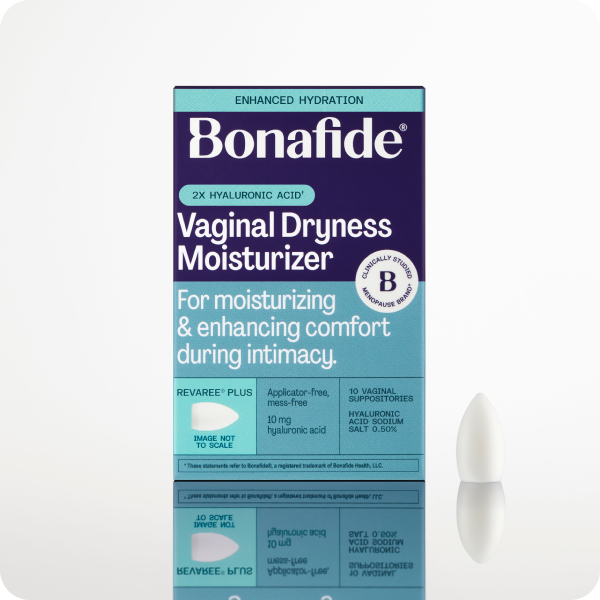I’ve noticed a real disconnect lately in the world of vaginal health, specifically as it relates to menopause. Seems most women associate menopause with one obvious symptom, hot flashes. These pesky flushes, accompanied by irregular bleeding habits, are often the first clues that something is up hormonally, and change is coming.
In fact, while hot flashes and wonky menses are iconic perimenopausal symptoms, another super common complaint often takes women by surprise – it’s “vaginal dryness” – in medical terms, vaginal atrophy or genitourinary syndrome of menopause(GSM). This condition encompasses a collection of uncomfortable symptoms including vaginal dryness, burning and painful sex. There’s often a disconnect with menopause because symptoms of vaginal dryness are often vague but broad, while still being both chronic and progressive.
Are you Wondering, “Why Do I Have Vaginal Dryness”?
Less estrogen during menopause means less blood flow to the vagina. And less blood flow to the vagina typically means less natural lubrication, making this a main cause of vaginal dryness. Common signs of vaginal dryness include vulvovaginal tissues becoming thinner, less elastic, more delicate and more prone to injury, especially during intercourse. The vagina may even shrink in length and width over time due to less estrogen and vaginal tissues may become dry and sore.
Other Reasons for Vaginal Dryness
Vaginal dryness isn’t just limited to women in the menopause crowd. Other common causes of vaginal dryness can include:
Smoking; this habit is not vagina friendly; it causes blood vessels to constrict. The result is diminished blood flow, including to the vagina, which negatively impacts the creation of natural lubrication and can increase the symptoms and severity of vaginal dryness.
Birth control pills may also be a cause of vaginal dryness. These pills work by suppressing ovulation and the hormone surges that are associated with it, which can lead to vaginal dryness and its associated symptoms, in some women.
Antihistamines may dry up more than just your nasal passages – they can affect numerous mucus membranes in the body, which includes your vagina. If you routinely take an antihistamine, you may experience dry vaginal skin and your vaginal tissues might become dryer as well.
Surgery, including the removal of ovaries or a total hysterectomy may influence vaginal health, which is why you may have vaginal dryness, vulvar atrophy and other disruptive physical changes to your vulvovaginal skin and tissues.
Certain medications can also potentially interrupt the creation of natural vaginal lubrication, which can cause vaginal dryness and lead to dry and sore vaginal skin.
Reasons to Treat Vaginal Dryness
There are clear and impactful physical and emotional consequences of struggling through vaginal dryness without seeking treatment.
First, women complain of pain or even bleeding during sex due to vaginal dryness. This can impact self-confidence and a woman’s sense of femininity. Effects on intimacy and relationships over time can be significant and can even negatively impact daily quality of life.
Vaginal infections, including yeast and bacterial vaginosis (BV), might result from untreated vaginal dryness. Vaginal itching, irritation and a change in vaginal scent may also occur.
Keep in mind, optimal vaginal health is directly related to a delicate balance of organisms and bacteria, making up the vagina’s natural microbiome. Lactobacilli are responsible for maintaining a healthy acidic vaginal pH, and less estrogen, which is experienced during the menopause transition, can lead to a vaginal pH change and symptoms of infection or a pH imbalance can soon follow.
Vaginal dryness also often leads to urinary complaints, including urgency, frequency and a proclivity to urinary tract infections (UTI).
Vaginal Dryness is Common During Menopause
Did you know that 1 in 2 menopausal women display symptoms of vaginal dryness? Shockingly, one study suggests only 50% of women with symptoms receive treatment.1 Why? Oftentimes, women don’t bring up the issue of vaginal dryness with their healthcare providers and vice versa. In addition, many women are unaware treatments for vaginal dryness are available, or perhaps they aren’t happy with treatment options offered.
Talk to Your Healthcare Provider If You’re Experiencing Vaginal Dryness
Whether it’s an as needed, over the counter lubricant for sex, a regularly used moisturizer, such as Revaree® Plus with hyaluronic acid to maintain comfort, vaginal estrogen replacement or other pharmaceutical solutions, a little TLC goes a long way to maintaining a healthy vagina and addressing vaginal dryness symptoms.
Remember, hormone-free treatment options can be used to address your vaginal dryness symptoms safely over the long-term. Being both proactive and consistent with your treatment will help reduce the signs and symptoms of vaginal dryness during menopause and beyond.Resources
- Kingsberg SA, Krychman M, Graham S, Bernick B, Mirkin S. The Women’s EMPOWER Survey: Identifying women’s perceptions on vulvar and vaginal atrophy and its treatment. J Sex Med. 2017;14:413-424.











Comments
Post commentTrying!
The pain during sex was miserable. My husband had problems, well so needless to say its been months since we have and physical contact. I just pray that this will work.
Bonafide products works
Revaree is an amazing product. I’ve been taking it for 3 years. I am a breast cancer survivor and take a estrogen blocking medication. It really works.
I am also post-menopausal and a breast cancer survivor. The combo of menopause and hormone blockers was quite a shock. While I could get wet, the change in vaginal tissues led to bleeding and a whole lot of pain, not to mention laundry. As a hormone positive breast cancer survivor I am reluctant to use estrogen cream. Reveree was a game changer. Thank you for giving me back a fulfilling and thrilling intimate life.